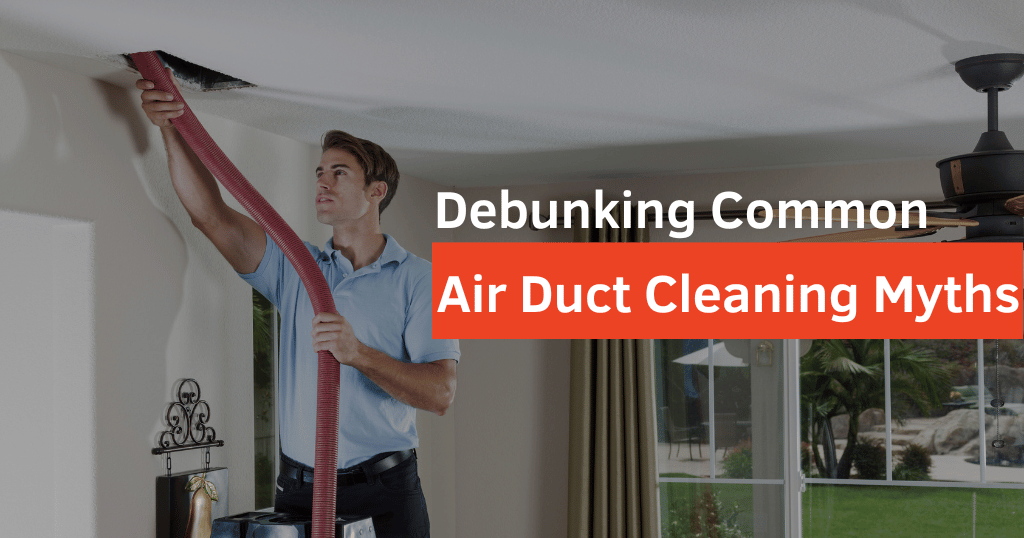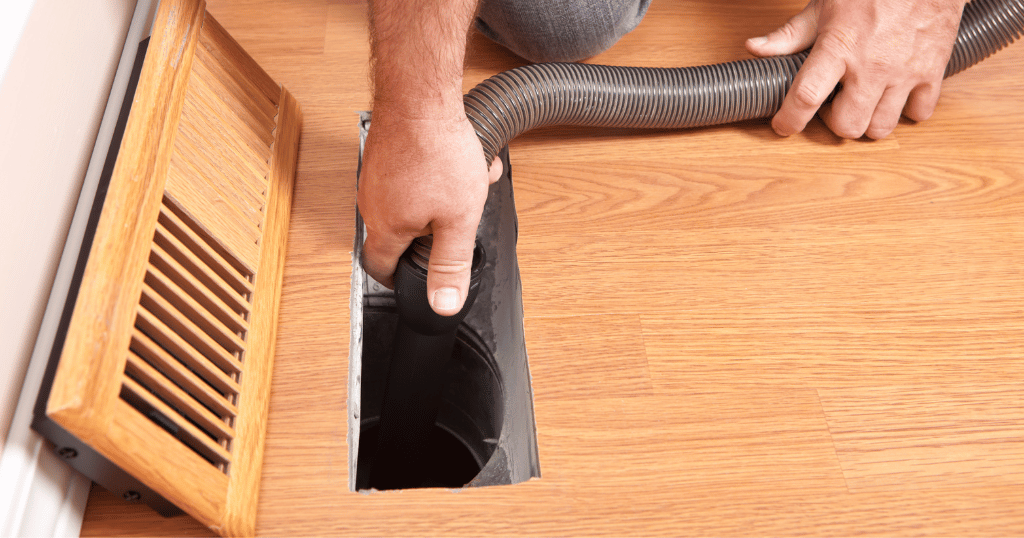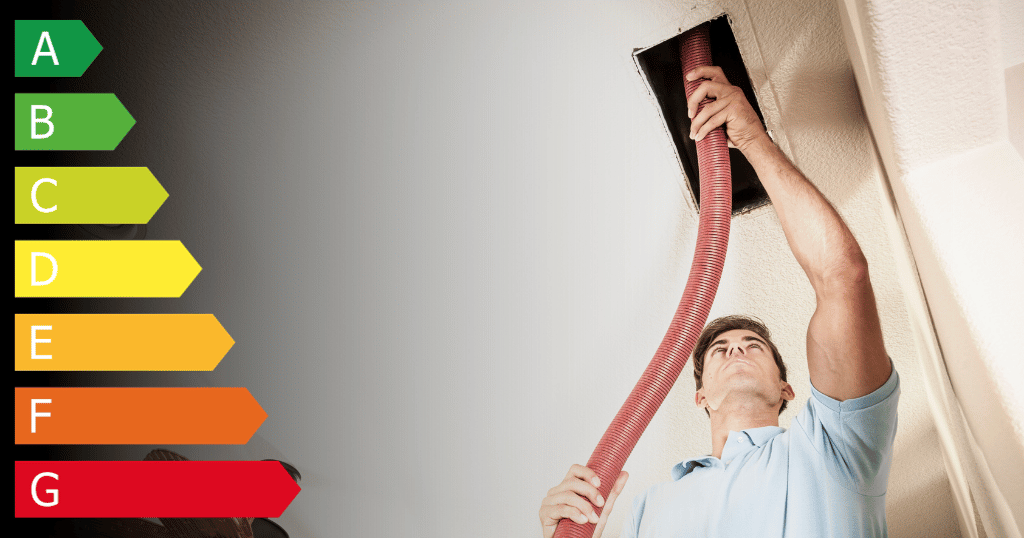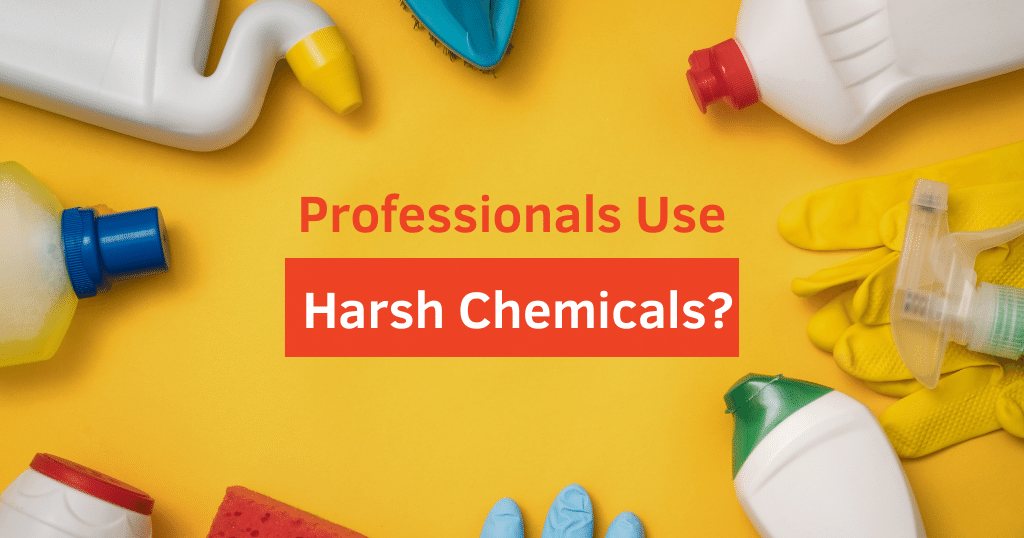All filters are made in the USA – Order Today

Have you ever noticed a pesky cough or itchy eyes after chilling at home? Your air ducts might be the culprit. These hidden highways circulate air, but over time, they can become dusty havens for pollen, pet dander, and even the occasional creepy crawly.
Now, you might be tempted to clean them yourself, armed with a trusty vacuum and some DIY YouTube tutorials. But hold on! Professional duct cleaning involves powerful tools and know-how to reach every nook and cranny, safely removing all that built-up gunk.
Plus, a professional air duct cleaner can identify hidden problems like mold or leaks that could be impacting your air quality and health. Over time, people develop misconceptions about air duct cleaning. For instance, they can clean their air ducts with just a vacuum cleaner and some tutorials, but in actuality, they can’t.
The first myth is debunked here. Do you find this content helpful? Want to learn more about the most common air duct cleaning myths? Keep reading our exclusive blog on the most common air duct cleaning myths.

The first air duct cleaning myth that most people have is that so little dirt enters the air ducts of their HVAC (Heating, Ventilation, and air conditioning) system, and they don’t get dirty. They remain perpetually clean and require little to no attention. However, the reality is different.
Over time, dust, debris, pet dander, and other particles might accumulate in the air ducts. Even with the best air filters, these contaminants find their way into the system, settling within the ductwork. This buildup not only affects indoor air quality but also impacts the efficiency of your HVAC system.
Air ducts are responsible for circulating air throughout your home, and when you don’t get them cleaned at the right time, they become breeding grounds for mold, bacteria, and allergens. As air circulates through the ducts, these pollutants are distributed, potentially causing respiratory issues, allergies, and other health problems. Regular air duct cleaning is essential for removing these hazards and maintaining a healthy living environment.
Contrary to the belief that air ducts remain pristine, they can get dirty over time and pose various health risks. Mold growth in dirty ducts can release spores into the air, leading to respiratory problems. Bacteria and allergens circulating through the system pose threats to those with allergies or respiratory conditions. Recognizing these potential health risks dispels the notion that air ducts never get dirty, emphasizing the need for regular cleaning.
The accumulation of dust and debris in air ducts not only jeopardizes indoor air quality but also affects the efficiency of your HVAC system. Clogged ducts force the system to work harder to push air through, leading to increased energy consumption and higher utility bills. Dismissing the myth that air ducts stay clean underscores the importance of regular cleaning in preserving the efficiency of HVAC systems.
In order to dispel the myth, it’s crucial to recognize signs indicating that your air ducts may be in need of cleaning. These signs include visible dust around vents, musty odors when the HVAC system is running, and a decline in indoor air quality. By acknowledging these indicators, homeowners can take proactive measures to address potential issues and prioritize regular air duct cleaning as part of their home maintenance routine.
Another prevailing air duct cleaning myth surrounding air duct cleaning is the belief that it’s necessary only for individuals with allergies. While it’s true that clean ducts can significantly benefit those with allergies, the misconception lies in overlooking the broader advantages that extend to everyone within a household.
Clean air ducts contribute to a healthier indoor environment for everyone, not just allergy sufferers. Over time, dust, debris, and contaminants accumulate in ductwork, impacting air quality and the efficiency of the HVAC system. Regular cleaning ensures the air circulating through your home is free from pollutants, creating a more comfortable and healthier living space for all occupants.
Even if you don’t suffer from allergies, neglecting air duct cleaning can lead to the circulation of mold, bacteria, and other irritants. Breathing in these contaminants can cause respiratory issues and other health problems, irrespective of whether you have pre-existing allergies. Dispelling the myth that duct cleaning is exclusively for allergy relief highlights its broader significance in preventing potential health issues for everyone in the household.
In addition to protecting you from various health conditions, clean air ducts contribute to the efficient operation of your HVAC system. Ducts clogged with dust and debris force the system to work harder to maintain the desired temperature, leading to increased energy consumption and higher utility bills. Regular cleaning, irrespective of allergy status, is essential for optimizing HVAC performance and reducing energy costs.
By dispelling the myth that duct cleaning is only necessary for allergy sufferers, homeowners can better understand the proactive role it plays in maintaining a clean and efficient home environment. Waiting until allergies become a significant issue may result in avoidable health risks and higher energy expenses. Regular air duct cleaning should be viewed as a preventive measure for overall well-being and optimal HVAC system performance.

Regular cleaning of air ducts directly translates to improved energy efficiency, which is one of the most common air duct cleaning myths that needs to be debunked. While it’s true that a clean HVAC system operates more efficiently, the misconception lies in assuming that frequent air duct cleaning is the sole factor influencing energy consumption and utility costs.
Clean air ducts play a crucial role in maintaining the efficiency of your HVAC system. When ducts are free from debris, the system can circulate air more easily, requiring less energy to achieve and maintain the desired temperature. However, it’s important to note that other factors also contribute to energy efficiency, such as the condition of the HVAC unit, the quality of insulation, and the overall maintenance of the system.
While regular air duct cleaning is beneficial, true energy efficiency arises from a comprehensive approach to HVAC system maintenance. This includes routine inspections, timely filter replacements, and ensuring that the entire system is in good working condition. Neglecting other aspects of HVAC maintenance may limit the potential energy savings that can be achieved through air duct cleaning alone.
Improving energy efficiency involves identifying and addressing specific issues within the HVAC system. Leaks, blockages, and inefficient components can all contribute to increased energy consumption. Regular inspections and targeted maintenance activities can help pinpoint and resolve these issues, complementing the benefits of clean air ducts.
While it’s important to recognize the role of clean air ducts in energy efficiency, it’s equally crucial to strike a balance in cleaning frequency. Overcleaning may not necessarily yield additional energy savings and can incur unnecessary costs. Following industry recommendations and assessing the actual condition of the ductwork can help homeowners make informed decisions about the timing of air duct cleaning.
One prevalent misconception in the realm of air duct cleaning is the belief that do-it-yourself (DIY) cleaning methods are both simple to execute and as effective as professional services. However, debunking this myth is crucial to understanding the complexities involved in maintaining clean and efficient air ducts.
Air duct systems are intricate networks that require specialized knowledge for proper cleaning. DIY methods often involve surface-level cleaning, such as vacuuming vents, but they may not address the full extent of contaminants within the ductwork. The complexity of the system’s layout and the presence of hidden areas make it challenging for amateurs to achieve a thorough cleaning.
DIY methods typically lack the specialized equipment and techniques used by professional duct cleaning services. Dust, debris, and microbial contaminants can accumulate deep within the ducts, and without proper tools, DIY attempts may only provide temporary relief or, in some cases, push contaminants further into the system, worsening the issue.
Engaging in DIY duct cleaning without adequate knowledge or protective gear can pose health and safety risks. Contaminants stirred up during the cleaning process may be inhaled, leading to respiratory issues. Additionally, using improper tools or techniques may damage the ductwork, resulting in costly repairs.
Professional duct cleaning services utilize specialized equipment, such as high-powered vacuums and rotary brushes, designed to reach deep into the ductwork. DIY methods relying on household tools may lack the necessary power and reach to effectively eliminate contaminants, leaving a significant portion of the duct system untouched.
Trained professionals understand the nuances of air duct systems, allowing them to identify and address specific issues. Their expertise extends beyond cleaning to include inspections, identifying potential problems, and offering solutions to improve overall system performance.

Here comes the last but one of the most common air duct cleaning myths. There’s a common misconception that professional air duct cleaners rely on harsh chemicals during the cleaning process. However, dispelling this myth is essential to understanding the standard practices employed by reputable professionals in the field.
Professional air duct cleaning service providers prioritize the use of safe and effective cleaning agents. Harsh chemicals can pose health risks to occupants and may cause damage to the ductwork. Reputable professionals opt for environmentally friendly, non-toxic solutions that effectively remove contaminants without compromising indoor air quality or the structural integrity of the system.
The use of harsh chemicals in air ducts can lead to the release of harmful fumes, negatively impacting indoor air quality. Professionals are aware of the potential health hazards associated with such chemicals and adhere to industry standards that prioritize the well-being of occupants. Non-toxic cleaning agents are chosen to ensure a thorough cleaning process without introducing harmful substances into the environment.
Harsh chemicals can cause damage to the inner lining of air ducts as well as to the HVAC system components. Reputable professionals understand the importance of preserving the integrity of the ductwork and the entire system. By using safe and appropriate cleaning agents, they can effectively remove contaminants without compromising the functionality and longevity of the HVAC system.
Professional air duct cleaning services adhere to industry standards and regulations that prioritize the use of safe and approved cleaning agents. These standards are designed to protect both the occupants and the infrastructure of the HVAC system. By following established guidelines, professionals ensure a thorough cleaning process without resorting to harsh or potentially harmful chemicals.
Part of dispelling the myth involves educating clients about the cleaning methods used by professionals. By providing transparency about the cleaning agents employed, professionals can reassure clients that the process is not only effective in removing contaminants but is also safe for the occupants and the environment.
Understanding the truth about air ducts is vital for the effective maintenance of your home’s HVAC system. Debunking myths, such as thinking air ducts stay clean or are only relevant for allergy sufferers, clarifies the importance of regular cleaning for everyone’s well-being. Recognizing that energy efficiency comes from a comprehensive maintenance approach, dispelling the idea that DIY cleaning is easy, and understanding that professionals prioritize safe cleaning methods complete the picture.
By learning these realities, homeowners can make informed decisions, ensuring cleaner air, better HVAC performance, and a healthier living environment. If you think that the air filters of your HVAC system need replacement, don’t delay doing so, and for high-quality HVAC filters, you only have to come to Custom Filters Direct – your go-to air filter provider.
Yes, cleaning your air ducts can be beneficial. Over time, air ducts can accumulate dust, debris, and contaminants, impacting indoor air quality and the efficiency of your HVAC system. Regular air duct cleaning can remove these pollutants, leading to cleaner air and improved system performance. It is especially beneficial for those with allergies, respiratory conditions, or in homes with pets. However, the frequency of cleaning depends on various factors, and it’s advisable to consult with professionals to determine the most suitable schedule for your specific situation.
If you don’t clean your air ducts, several negative consequences can arise:
Overall, neglecting air duct cleaning can result in a less comfortable living environment, increased health risks, and higher energy costs. Regular cleaning is essential for maintaining a healthy home and ensuring the optimal performance of your HVAC system.
If you have an AC, it likely comes with an air filter that captures larger particles. However, for more thorough air purification, especially targeting smaller particles like allergens and pollutants, an air purifier is beneficial. It complements the AC by enhancing indoor air quality. So, while an AC helps with temperature regulation, an air purifier with a focus on air quality may be useful for specific health concerns or areas with poor air quality.
Custom Filters Direct is one of the leading providers known for offering customized air filters. The effectiveness of an HVAC air filter depends on factors like filter efficiency, MERV rating, and compatibility with your system. Assessing your specific needs and ensuring the right fit for your HVAC system is crucial in determining the best option for you. Regularly replacing filters is key to maintaining indoor air quality and system efficiency.
Have any questions? We’re here and ready to help!
© 2022 Custom Filters Direct. All rights reserved.